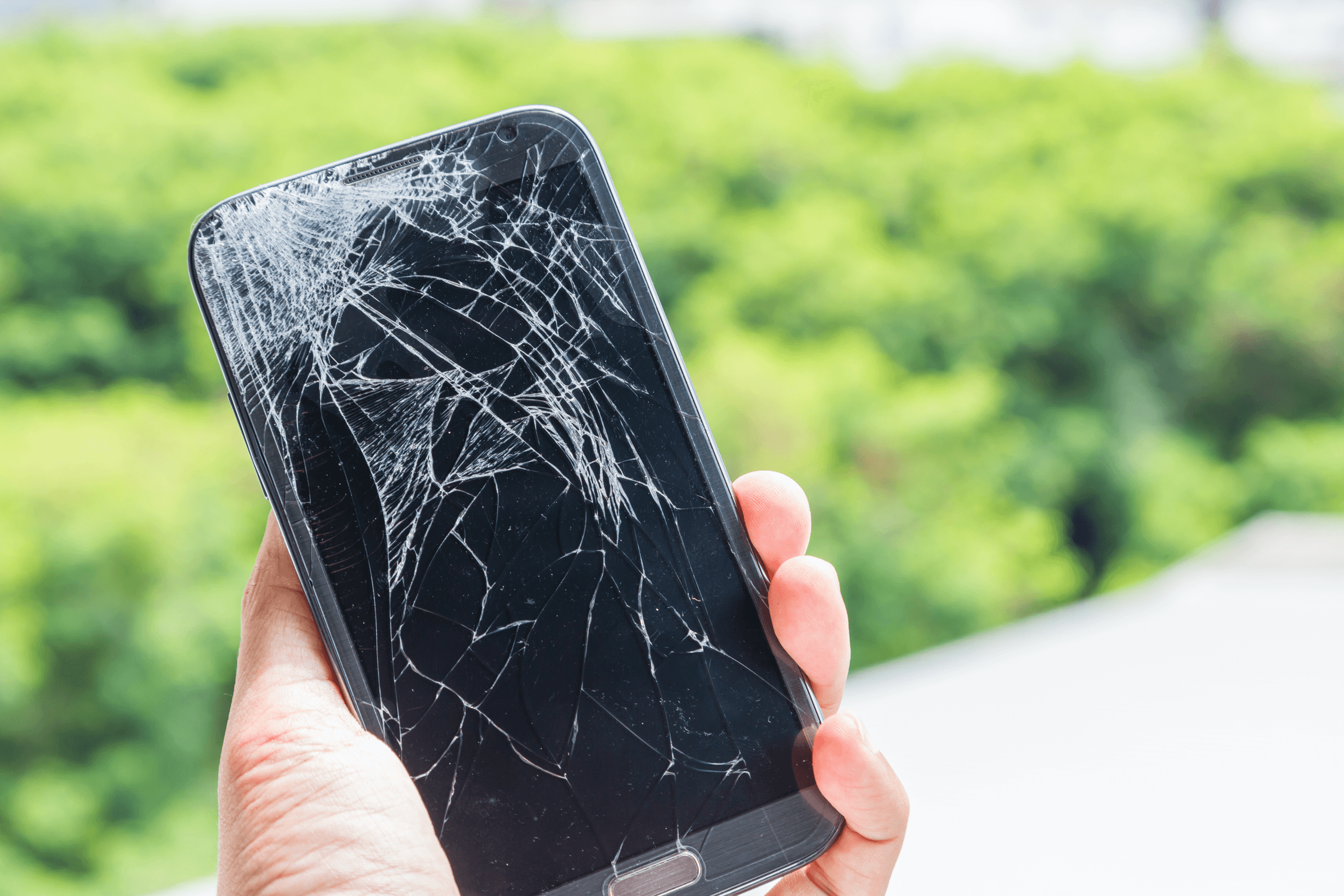
It happens at the worst times. You drop your phone and hear a shatter or you accidentally drop your phone in the sink when you’re washing your hands. As you watch your $1,000+ investment shatter or drown, all you can think about is how you’ll replace it because we all know you can’t live without it.
There’s a solution for it – cell phone insurance.
Most providers offer it, but each provider has different terms, what’s covered, and of course cost.
What is Cell Phone Insurance?

Cell phone insurance is coverage you pay for in the event that you break your phone or it’s lost or stolen. Since cell phones can be an investment, it makes sense that some people protect it with insurance, especially if you’re the type that constantly drops your phone or loses it.
That doesn’t mean the insurance doesn’t have its downsides, though. Like all policies, there are terms and conditions you must abide by and if you don’t know the fine print, you might find that you aren’t covered the way you thought.
How Does it Work?

Cell phone insurance works like any other insurance – you pay premiums monthly for coverage. You pay the premiums whether or not you make a claim that month and you’re limited to a certain number of claims. Each company is different, but the average maximum claim is 3 per 12 month period.
Every cell phone insurance policy covers something different, but here’s the general gist of what they cover.
Cracked Screens
How many times have you dropped your phone and cracked it? Cell phone insurance plans often cover it, but with a deductible. The average deductible is $29, so every time you crack your screen, you’d pay $29 to have it repaired.
Mechanical Damage
Manufacturer warranties only last for a certain amount of time, and once they run out the cost of repairs falls on your shoulders. With cell phone insurance, though, you can get the damage covered. Not all policies offer this coverage, though, so always read the fine print. The deductibles for mechanical damage vary by plan.
Lost or Stolen Phones
If your phone is lost or stolen, cell phone insurance may cover the cost of replacing it. This comes with the highest deductible, though, since they are covering a new phone. Be careful with this coverage, though, as not all plans will send you a new phone – many will send a refurbished phone instead.
Battery Replacement
Some (but not all) policies cover battery replacement. The combination of cracked screen repair and battery replacement can be a real winner if those are the two things you spend the most money on with your phone. Some policies cover an unlimited number of battery replacements and others have a limit.
What Doesn’t it Cover?
Like any insurance policy, there are certain things cell phone insurance won’t cover, including the following.
Intentional Damage
If the insurance company can prove you did something intentional to your phone, they won’t cover the damage. It must be accidental, like you dropped it while riding a bike or it slipped from your hand into the water when you were in the bathroom.
Unauthorized Repairs or Changes
If you had anything done to your phone (or you did it yourself) that wasn’t approved by your carrier, the insurance company may not cover the issues. To avoid this from happening, only have an authorized center by your phone company touch your phone.
Fraudulent Activity
If there is anything fraudulent about your claim, including trying to get phones covered that aren’t on the plan covered, your claim will be turned down. You might also lose your insurance policy.
Who Should get Cell Phone Insurance?

Cell phone insurance is good for people that know they are accident-prone and often end up fixing their phone. It can be expensive to pay for repairs and keep up with your monthly payments.
It can be even more expensive if your phone is lost or stolen and you have to cover the cost of what’s left on your installment plan plus the cost of a new phone.
If you are always repairing phones or losing important things, cell phone insurance might be a good idea at least for the first year. As you pay your installment balance down and the phone has a lower value, it doesn’t make as much sense to pay for the insurance since it would probably cost less to pay your contract off.
Who Shouldn’t Get Cell Phone Insurance?

If you are the type of person that takes good care of their things, rarely loses anything, and has never fixed a cracked screen in your lifetime, it may not make sense to get cell phone insurance.
Even if you used the insurance one time to fix a cracked screen, for example, you’d pay $29 plus the premiums you’ve paid up to that point. Let’s say you paid 12 months of premiums at $15. That’s $209 to fix your cracked screen. Chances are you could find a reputable service company to fix your screen for much less than that.
Even if you were to lose your phone, you’d have a hefty deductible, usually between $229 – $250, which if you add to the premiums you paid, almost pays half of your installment agreement and you might have nothing to show for it.
Alternatives to Cell Phone Insurance

If cell phone insurance isn’t worth it for most people, then what alternatives do you have? There are several.
Homeowner’s Insurance
Your homeowner’s or even renter’s insurance may cover a stolen or damaged phone. No matter where the phone is stolen, your home or renter’s insurance might cover it. If your phone is damaged at home, such as in a fire or flood, your insurance may cover it.
Read the fine print and make sure personal belongings are covered and if they are, find out the maximum value they will cover. Some phones may be worth more than your personal belongings.
Insurance from your Credit Card
Many credit cards offer insurance for cell phones. Read the fine print on the card’s terms. You might even find that they cover every cell phone in the household. Most people overlook this as an option because they aren’t aware of the benefits their credit card offers.
Self-Insure
You don’t have to pay an insurance company to insure your phone. Instead, put money aside yourself each month in an account just for your phone. If you have a loss or damage to your phone, you can use the money you set aside to pay for it.
As a bonus, you can earn the interest on the funds rather than paying an insurance company premiums and seeing no return on it if you don’t have to make a claim.
FAQs – Should you get Cell Phone Insurance?
What happens if you lose your phone with no cell phone insurance?
If you don’t have insurance and you lose your phone, you should check with any other sources you have such as homeowner’s insurance or insurance provided by your credit card company. If you don’t have any type of coverage, talk to your cell phone provider about what’s next. You likely have to pay off the balance of what’s left, but you may be able to upgrade to another phone and work out a payment plan.
Can you buy cell phone insurance after buying a phone?
It’s easiest to buy cell phone insurance when you buy a home. If you didn’t take advantage of the opportunity, you can buy cell phone insurance for 30 days after the purchase. Usually, you can log into your account online and add it, but if you can’t, you can always go back to the store where you bought the phone to add it to your plan.
Can you cover more than one phone on your cell phone insurance?
You might be able to cover more than one phone on your cell phone insurance plan. Many companies offer a financial break if you insure more than one phone. It’s worth asking if you want to insure multiple phones in your family rather than insuring them separately.
What is a deductible?
The deductible is the amount you must pay for the damage to the phone or to replace it. Cracked screens have the lowest deductible and lost or stolen phones have the highest deductible, sometimes as high as $200 – $300.
Final Thoughts – Is Cell Phone Insurance Worth It?
Cell phone insurance isn’t always worth it. Unless you are the type of person that doesn’t save money (putting it aside) and you always break your phones, there isn’t a lot of value in the insurance especially if you have options elsewhere.
